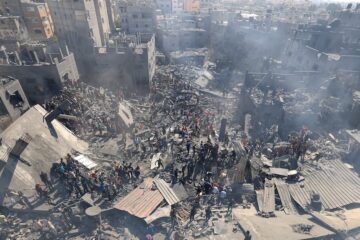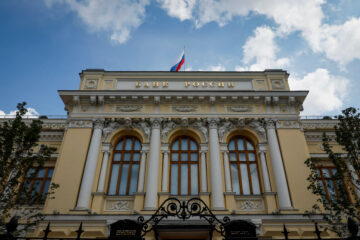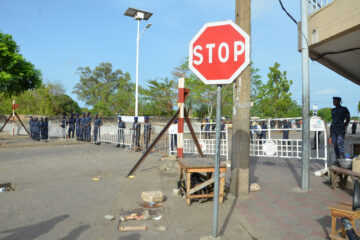Crimean parliament votes to join Russia, moves referendum date to March 16
If Russia agrees to Crimea\’s request, the Crimean people will be asked two questions in the 16 March referendum, the statement says:
Are you in favour of reuniting Crimea with Russia as a subject of the Russian Federation?
Are you in favour of retaining the status of Crimea as part of Ukraine?
The Crimean parliament voted to join Russia on Thursday and moved a referendum on whether the Autonomous Republic of Crimea should stay with Ukraine or join Russia to March 16.
The parliament unanimously adopted a motion on Thursday for the strategic peninsula to join the Russian Federation.
In remarks to the Reuters news agency, Crimea\’s deputy prime minister, Rustam Temurgaliyev, said: "The Ukrainian armed forces have to choose: lay down their weapons, … accept Russian citizenship and join the Russian military."
"If they do not agree, we are prepared to offer them safe passage … to their Ukrainian homeland."
Ukraine\’s acting president, Oleksander Turchinov, denounced the parliament in Crimea as "totally illegitimate… They are forced to work under the barrel of a gun and all their decisions are dictated by fear and are illegal".
The Crimea parliament also said a referendum on the region\’s status was being brought forward to from March 30 to March 16. Temirgaliev said there would be two questions on the ballot.
"The first: Are you in favor of Crimea becoming a constituent territory of the Russian Federation. The second: Are you in favor of restoring Crimea’s 1992 constitution.” According to the 1992 constitution, Crimea is part of Ukraine but has relations with Kiev.
The Crimea parliament, which is afforded some autonomy under current Ukrainian law, voted 78 with eight abstentions in favour of holding the referendum.
About 11,000 pro-Russian troops are in control of the peninsula and have blocked all Ukrainian military bases that have not yet surrendered, according to the regional leader, Sergei Aksyonov.
All or most of those troops are believed to be Russian, even though Moscow has repeatedly denied sending in soldiers.
The US president, Barack Obama, meanwhile issued an executive order on Thursday saying that Russia\’s involvement in Crimea constituted "an unusual and extraordinary threat to the national security and foreign policy of the United States".
His order authorised sanctions against "individuals and entities responsible for activities undermining democratic processes or institutions in Ukraine.\’\’
Earlier in the day the Ukrainian prime minister, Arseny Yatsenyuk, urged Russia to engage with international mediation efforts, while the UN and the EU holding emergency meetings to discuss the Ukraine crisis.
Yatsenyuk made the plea meeting the president of the European Parliament, Martin Schulz.
"We ask Russia to respond, whether they are ready to preserve peace and stability in Europe, or they are ready to instigate other provocations and tensions in our bilateral and multilateral relations," according to Reuters news agency.
But the Russian foreign minister, Sergey Lavrov, also expected at the Rome meeting, criticised developments of the last 48 hours, namely NATO\’s decision to suspend collaboration with Moscow.
In a statement, Lavrov said: "I want to very briefly say that we had a meeting with the US secretary of state, John Kerry, on the situation in Ukraine in relation to the actions that our partners are trying to take – action that does not help create an atmosphere for dialogue and constructive cooperation."
Source: Agencies
[do_widget_area inner_adsbar]








